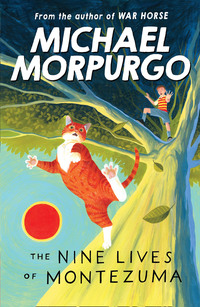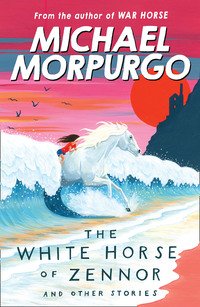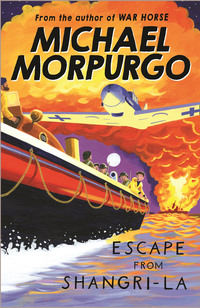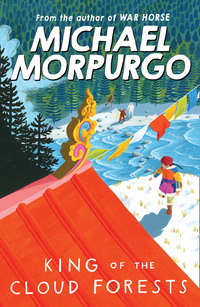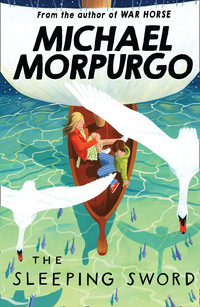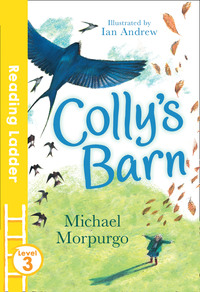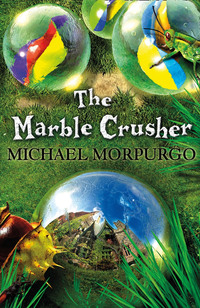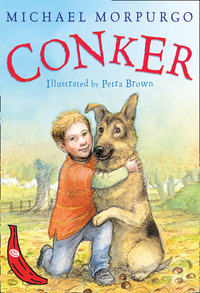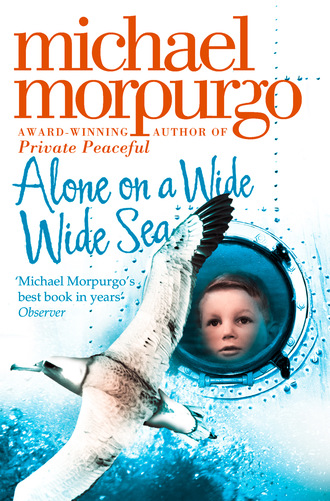
Полная версия
Alone on a Wide Wide Sea
I’ve had a lot of time to think things over since. I’m still angry about Cooper’s Station, about what they did to us there. But we weren’t the first. Two hundred years or so before we were sent out from England to Australia, others had made the same journey we did. They had come in chains in the stinking bowels of transport ships. We may have come in a beautiful ship, with pillar-box-red funnels and an orchestra, but we were prisoners just like them. And they must have very soon discovered, as we did, that you weren’t just a prisoner, you were a slave as well, and that when you’re a slave they don’t just take away your freedom, they take away everything else as well because they own you. They own you body and soul. And the soul, we were about to find out, was particularly important to our owners.
I can’t pretend I had any understanding of all this then, lying there clutching my lucky key in the sweltering darkness of the dormitory during my first night at Cooper’s Station, but I knew already that the dream had died. Marty lay in the bunk next to me, stunned to silence like the rest of us. He cried that night, the only time I ever heard Marty cry. I knew now this brand-new country we had come to was not a paradise after all. It was, as we were soon to discover, a hell on earth – a hell specially devised for children by Mr Bacon, Piggy Bacon we called him, who was to be our gaoler, slave-master, preacher and brand-new father, all in one.
I can honestly say that Piggy Bacon was the only person in all my life that I ever wanted to kill. But to be fair to him, he did at least tell it to us straight. That first morning at Cooper’s Station, after washing from the buckets lined up out on the verandah, after our breakfast of lukewarm, lumpy porridge, he told us exactly why we were there. We were all gathered there shivering outside the dormitory block. Mrs Bacon was at his side in her blue dungarees and flowery apron, tiny alongside his great bulk. He was a great thickset bull of a man, red-faced with short, cropped ginger hair and a clipped ginger moustache, and little pink eyes – even his eyelashes were ginger. He always seemed to me like a man on fire and about to explode. His vast stomach looked as if it was only just held in by his checked shirt and broad belt, a belt every one of us would have good cause to fear as the months passed. He wore knee-length boots which he’d whack irritably from time to time with the stick he used to carry – the same stick he would use for punctuating his speeches – speeches which, like this one,always turned into sermons. Sometimes he’d carry a whip for cracking at the dogs, at the cattle or the horses, or us if he felt like it. Stick or whip, it didn’t matter to us – we came to fear both just as much.
Mrs Bacon smiled the same fixed nervous smile that day that I so often saw afterwards. We didn’t know the reason she was nervous, not then. She seemed shrunk inside her dungarees – I think she always wore the same blue dungarees, only the aprons changed. I sensed from the first that Mrs Bacon was frightened, that she was hiding something. Her face was drained of all colour. I never in my life saw a woman look more weary. She stood there, her eyes downcast, as Piggy Bacon told us all the whys and wherefores, the do’s and don’ts of Cooper’s Station.
“You can count yourselves very lucky,” he began, “that Mrs Bacon and I have taken you in. No one else would, you know. We did it out of the kindness of our hearts, didn’t we, Mrs Bacon? Out of the kindness of our hearts, that’s what it was. You are the little ones no one else wanted. You are the little ones thrown out of the nest, rejected and with no home to go to, no one to look after you, no one even to feed you. But we will, won’t we, Mrs Bacon? We will feed you and house you, we will clothe you and teach you about hard work and the ways of God. What more could a child ever want? Mrs Bacon and I are God fearin’ folk, Christian folk. We were brought up to know our duty. ‘Suffer little children to come unto me,’ the good Lord said. So we are doing his will, and this we shall train you to do as well. A child is born sinful and must be bent to the will of God. That is now our task.
“So we have offered to take you in, at our own expense mind, out of good Christian charity. We have built you this home for your shelter – your shelter from the storm of life. You will help us make a garden of Eden, a paradise out of this wilderness. Mrs Bacon and I will be like a mother and father to you, won’t we, Mrs Bacon? And your training in the ways of the Lord will begin right now. There will be no swearing, no idleness – I promise you, you will be kept too busy ever to be idle. You will work to earn your keep. And you will work because the Devil makes work for idle hands. If you work we shall feed you well. If you work well you may play for one hour at the end of each day, the last hour before sundown.
“Look out there!” he roared suddenly, waving his stick towards the horizon. “Look! Do you see? Nothing. Nothing but wilderness as far as the eye can see, and that nothing goes on for miles and miles north, south, east and west. So don’t you ever think of running off. You’d go round in circles out there. You’d die of thirst, be shrivelled up by the sun. The snakes would bite you, the crocs would eat you up, or the dingo dogs would tear you to pieces. And even if you survived all that, the black fellows would soon find you – they always do what I say – and they’d just bring you right back here to Cooper’s Station. Isn’t that right, Mrs Bacon?”
Mrs Bacon did not respond. She just stayed there beside him, eyes still lowered, while he ranted on.
When she thought he’d finished she walked away towards the farmhouse, followed closely by her dun-coloured dog, a furtive frightened creature like his mistress, who slunk along behind her, his tail between his legs. But Piggy Bacon had not finished, not quite. He glared after her, and then slapped his boot with his stick. “It’s God’s work we’re doing,” he said. “God’s work. Always remember that.”
And so to God’s work we went.

Suffer Little Children
Piggy Bacon kept his promise to us faithfully: he did indeed always keep us too busy ever to be idle. From that day on anything that needed doing on the farm we children did it. We were the slaves that tried to carve his paradise out of the wilderness for him. The work was either smelly or back-breaking and often both at the same time. There were thirty milk cows and their calves and a hundred bullocks or more on that station. We fed them, watered them, drove them,cleaned up after them. And before long we were milking the cows too. I ached from my fingers to my shoulders with the work of it. Then there were Piggy Bacon’s chickens – he had hundreds of them – and his pigs and his horses too.
Mornings were spent mostly refilling the wash buckets from the pump, shovelling muck, wheeling it out to the dung heap from the calf sheds, or spreading it on the paddocks. And always the flies found you, every fly in Australia. They were all around you, in your eyes, in your hair, up your nose even, and they were biting ones too. And if you swallowed one – and you often did – you’d try to retch it up, but you never could. We couldn’t escape them any more than the animals could.
Lunch was soup and bread brought to our long trestle table in the dormitory and ladled out into our bowls by Mrs Bacon, who scarcely ever spoke to us. We lived on soup and bread in that place. Then in the afternoons we’d be set to clearing the paddocks of stones, or we’d be fetching and carrying water to the troughs, and blocks of salt too. These buckets almost pulled my arms out of my sockets they were so heavy. You had to fill them right up too, because if ever Piggy Bacon caught you carrying a half-empty bucket you were in big trouble, and trouble always meant the strap. So we filled them up full to the brim every time. And when all the water-carrying was done, we’d be digging up weeds or filling in potholes in the tracks, or pulling out tree roots, all of us straining together on the ropes.
Our hands blistered, our feet blistered. Bites and sores festered. None of that mattered to Piggy Bacon. Once one job was done there was always another waiting. We worked hard because he’d stop our food just like that if we didn’t. We worked hard because he’d strap us if we didn’t. We worked hard because if we didn’t he’d cancel our evening playtime and make us work an hour extra at the end of the day. I so longed for that hour off – we all did – and we hated to miss it. That promise of an hour’s playtime was what kept me going when every bone in my body ached with tiredness.
Feeding up the animals was the last task of the day, the only work I really enjoyed. Chickens, cows, pigs, horses – it didn’t matter – I loved to see them come running when they saw us with our sacks of feed. I loved to watch them loving it. But the milking I never liked. My fingers couldn’t cope. They swelled easily and I couldn’t sleep afterwards for the pain. Marty and I – we always tried to be in the same work party – would feed a few by hand if we could, if Piggy Bacon wasn’t around to catch us. The chickens tickled you when they pecked the corn out of your hand, and the horses’ noses felt warm and soft as they snuffled up their feed – you had to watch out in case they snuffled up your fingers as well.
There was one horse in particular Marty and I loved more than all the others. He was huge, a giant of a horse, shining black all over except for one white sock. Big Black Jack he was called, and whenever we were lucky enough to get to feed him, Marty and I made sure he had all the food and water he needed, and then some. I’d crouch there by his bucket, watching him drink deep, listening to his slurping, laughing at his dribbling when he lifted his head out of the bucket. I’d sing London Bridge is Falling Down to him, and he’d like that. He was Piggy Bacon’s plough-horse, and Piggy treated him just as he treated us, worked him to the bone, till his head hung down with exhaustion. Horses, I discovered, when they’re tired or sad, sigh just like people do. Big Black Jack used to do that often. We’d look one another in the eye and I’d know just how he felt and he’d know just how I felt too.
Whatever job we were doing, whenever we were out on the farm, we could be sure Piggy Bacon would turn up sooner or later. He would appear suddenly, out of nowhere. He only ever came for one reason, and that was to pick on someone for something. Each time I hoped and prayed it was someone else he’d pick on. But sooner or later my turn would come around. We either weren’t working fast enough, or hard enough. A water bucket wasn’t full enough, or he’d find a field stone we hadn’t picked up – any excuse would do. He wouldn’t strap us there and then. Instead he’d tell us how many whacks the particular crime merited and then give us all day to think about it. That was the torture of it, the waiting.
The punishment parade would take place in the evening outside the dormitory hut just before supper and before we were locked in for the night. He’d call you out in front of the others and then pronounce sentence on you just like a judge. And you’d stand there, hand outstretched, trembling and tearful. It happened to all of us, and often. No one escaped it. But Marty got it more than most, and you could see that when Piggy Bacon strapped Marty he did it with real venom. There was a good reason for that: Marty’s look.
It was the same look he’d used on that officious man on the dockside the first day we landed in Australia. The thing was that Marty would never be cowed. He would look Piggy Bacon straight in the eye, and that always set Piggy Bacon into one of his terrible rages. The rest of us kept our heads down, just tried to keep out of trouble. Marty fought back with silent defiance. And he didn’t cry out like I did, like the rest of us did, when we were strapped – he wouldn’t give him the satisfaction. He just stood there unflinching, his jaw set, his eyes stoney, no tears, no trembling. And to add insult to injury, he’d say thank you afterwards too, his voice as stony as his stare. I’d like to say we all took heart from that, but we didn’t. We admired him though – everyone did. But he wasn’t the only one who fought back. We soon had another hero to admire, a most unlikely hero too – Wes Snarkey.

Wes Snarkey’s Revenge
Neither Marty nor I had ever much liked Wes, and Wes made it quite obvious he didn’t much like us either. I could never forget how he and his cronies had tormented me almost every night on the ship, and I’m sure he could not forget how Marty had come to my defence and humiliated him on the deck that day. That must still have rankled with him. So the result was that we hardly ever spoke. In fact he hardly ever spoke to anyone during those first months at Cooper’s Station. In the dormitory, at the line of wash buckets on the verandah, eating at the long trestle table, out at work on the farm, he kept himself to himself. Even at evening playtime when we’d all be kicking a football around, he’d sit there on his own, gazing out at nothing. Of all of us Wes Snarkey was the only loner. But then one day I found out that he wasn’t really a loner at all. He had a friend – a best friend.
Time and again Piggy Bacon had strapped him for wandering away from his work. No one knew where he went and he didn’t tell anyone. One moment he’d be there digging a ditch alongside you, the next he’d be gone. Strapping Wes didn’t stop him from sneaking off, so I knew that whatever he was doing, wherever he was going, must have been really important to him. We were mucking out the pigs one day when I noticed he’d gone off again. I made quite sure Piggy Bacon wasn’t about, and went looking for him. I found him by Big Black Jack’s paddock. I crouched down behind the trunk of a fallen gum tree and watched him. He was standing by the fence, feeding Big Black Jack with some bread crusts, and he was talking to him as if he was a real person, not a horse at all. I was close enough to see everything, and to hear everything too.
Wes was telling him about a horse he’d known in England, in Leeds, a milkman’s horse, a piebald mare she was, and how every morning he’d sit on the wall of the orphanage in the early morning and wait for her to come, how he’d save his bread crusts to feed her, how one day the milkman had let him sit on her, and they’d gone off down the street, how it was the best day of his life. “Will you let me ride you one day, Jack?” he whispered, smoothing his neck. “Would you? I could ride you out of here and we’d never come back.”
I must have shifted then or maybe it was a gust of wind that rustled the pile of dead leaves where I was crouching. Whatever it was, Wes turned around and saw me there. We stared at one another, not speaking. I could see he had tears in his eyes, and on his face too. He brushed them away hurriedly with the back of his hand then ran off before I could say anything. And I was going to say something. I was going to say that I liked Big Black Jack too, that we could be friends now if he wanted.
As it happened it was only a few days later that Wes Snarkey became everyone’s friend, and that was on account of Piggy Bacon and his whip. Down near the creek, which was dried up for most of the year, there was an old tree stump we couldn’t pull out. We’d been digging around it, and trying to pull it out for a whole day. With all of us hauling on the ropes, and even with Piggy Bacon lending a hand himself – and that hardly ever happened – we still couldn’t shift it. So in the end Piggy Bacon harnessed up Big Black Jack and got him to do the job instead. But no matter how hard Jack strained at the ropes, the stump would not budge. Piggy Bacon shouted at him, but it did no good. Big Black Jack was doing all he could, we could see that. Piggy Bacon took a stick to him then, and whacked him again and again. He was bellowing at him.
“Useless bag of bones! Lazy devil! You good-for-nothing, you!” Then Piggy Bacon used his whip on him. In a frenzy of fury and frustration he whipped him till he bled. That was when Wes Snarkey went for Piggy Bacon.
He ran at him, screaming like a wild thing, head-butted him full in the belly, knocking the wind out of him and sending him sprawling in the dust. They rolled over and over with Wes ending up on top, sitting astride him and pounding him with his fists. And we were all cheering then and leaping up and down, until Mrs Bacon came running out from the house and pulled Wes off him, but not before the damage had been done, not before blood had been drawn.
Piggy Bacon was never quite as frightening to us again after that. His temper could still be terrifying, and we still hated him just as much. But we had seen the wicked giant felled. We’d seen his blood. He made Wes pay of course. He made us all pay. We had no playtime for a week, and no bread with our soup for a week either. Wes got twelve strokes of the strap that night and didn’t seem to mind a bit. He sat on his bunk nursing his hand afterwards grinning up at us, looking happy as Larry. He knew he’d made new friends of all of us, and he was happy. So were we. From that day on there was a solidarity among us. We smiled more. We joked more. All this had been Wes Snarkey’s doing. He’d had his revenge and it was sweet revenge for us all. He wasn’t just a friend now, he was our hero too.

Saints and Sinners
Sunday at Cooper’s Station was the only day we didn’t have to work. We sang hymns and psalms, said our prayers and heard sermons instead. They went on all morning, outside the dormitory usually or inside if it was wet – which wasn’t often. Piggy would stand on a box and harangue us with his sermons in between the hymns. Mrs Piggy, as we’d all come to call her, standing dutifully at his side, her dog lying at her feet fast asleep and twitching in his dreams, which broke the monotony of it. It was a welcome distraction and gave us something to nudge one another and wink about.
Mrs Piggy would play the squeezy box to accompany the hymns, and would sing out, her voice surprisingly strong, leading us all, her eyes closed in fervent concentration. This was the only time you would ever see her confident and full of conviction. She seemed to be carried away on the wings of faith, lost absolutely in the spirit of the hymns. Her piping voice rang out passionate with belief. After every hymn, she would cry out at the top of her voice: “Alleluia! Praise the Lord!” Then she’d lower her head and at once shrink back inside her shell, inside the Mrs Piggy we all knew, timid and tired and terrified, as Piggy Bacon launched into yet another thunderous sermon about the saints above and the sinners below, by which he meant us, about devils and hellfire and damnation. Through it all the dog slept blissfully. We just wished we could do the same.
But we weren’t the only ones at the Sunday services. This was the only day the Aboriginal people, who lived in the country round about and who sometimes came to work on the farm – the “black fellows” Piggy called them – were allowed to come near the house. We’d see them often enough, the children mostly, when we were out on the farm, just crouching there in the distance watching us. Or sometimes we’d catch sight of a group of them moving through a heat haze on the horizon, not walking at all, it seemed to me, but rather floating over the ground. If ever they wandered in too close Piggy Bacon would go after them on his horse and drive them away with his whip, calling them all thieves and drunkards. But on Sundays Mrs Piggy invited them in for cakes and prayers. Even then they didn’t like to come too close, but they’d squat down at a safe distance from us to listen to the hymns and sermons.
Afterwards Mrs Piggy would go over to them carrying a tray of cakes and lemonade, and she’d make the sign of the cross on their foreheads and bless them. None of us had seen that many black faces before, just an occasional one passing by in a London street perhaps, and I’d noticed one or two black American GIs in uniform driving around in jeeps back home. These people went barefoot in ragged clothes and their children ran about naked, and they made you feel uncomfortable because they seemed always so still as they squatted there scrutinising you, their dark eyes looking right into yours. They stared. We stared. But we hardly ever spoke. You could never tell what they were thinking. But I liked having them there. They were company. And in this desolate place of wide skies and wide horizons, where we saw so few people, just their presence was a comfort.
Hardly anyone besides them ever came to Cooper’s Station. A truck coming down the long farm track was a real event for us, because it was that rare, maybe one or two a week, that’s all – delivering animal feed, or fencing wire, or seed perhaps. The drivers often sat on the verandah and drank lemonade with Piggy and Mrs Piggy. They had cakes too. We got cakes and lemonade only on Sundays, our big treat of the week, one each with a cherry on the top. We’d line up and Mrs Piggy handed one to each of us. She’d bless us and sign a cross on our forehead too. I liked that. It was the only time she ever touched us. I always took the cherry off my cake, put in my pocket and kept it till last. Sometimes I’d keep it until I was in bed, and I’d lie there letting it melt slowly in my mouth, my hand grasping my lucky key all the time.
They tried to make us say our prayers at night. We’d all have to kneel there for ten minutes in silence. I never prayed, but I did wish. Every night, clutching the key around my neck, I wished myself out of there, wished myself back home in England, back with Kitty.
In that first year, like everyone else, I almost found myself liking Mrs Piggy, and not just because of her Sunday cakes either – though that certainly had something to do with it. The truth was I felt sorry for her, we all did. And in a way I suppose she had our respect too. Unlike Piggy Bacon himself, she worked as hard out on the farm as we did. She milked the cows with us in the morning and evening, and she made all our meals too. The porridge and the soup and bread and the milky puddings may have been repetitious and tedious, but it was hot and it was regular. And Mrs Piggy did it all.
Then there were the good days, the only good days, when Piggy Bacon drove off in his truck into town, and we’d be left alone on the farm just with her. We still had our work to do, but she’d do it with us. And on these rare and happy days you’d see all the tension and the exhaustion lift from her shoulders, and even hear her laugh sometimes. We were the same. Without Piggy Bacon there, we could fool around, have fun! On those days she was a different person.
But every time it would be over all too soon. Unlike her there was some refuge for us, together in our locked dormitory at night. We had each other too. She still had Piggy Bacon. Sometimes, the worse for drink, he’d throw things at her – you could hear the sound of smashing crockery in the farmhouse. You’d hear him shouting at her, hitting her too, beating her. I never saw it happen, but we heard it.
“Don’t you dare tell me how to treat them! I’ll do what I like and how I like, you hear me woman?” He’d go on and on at her.
We’d lie there listening, and the next morning we’d see the bruises. So in time we began to feel she was one of us, just as much Piggy Bacon’s slave as we all were. I’ve often wondered why she endured it, why she stayed with him. There’s really only one answer that makes any sense at all: for the love of God, for Jesus’ sake. I never knew a more devout woman than Piggy Bacon’s wife. She was married to him in the eyes of the Lord, so she could never leave him. As we were to discover, she was a woman who didn’t just believe, she really lived her faith, and she suffered for it too.


